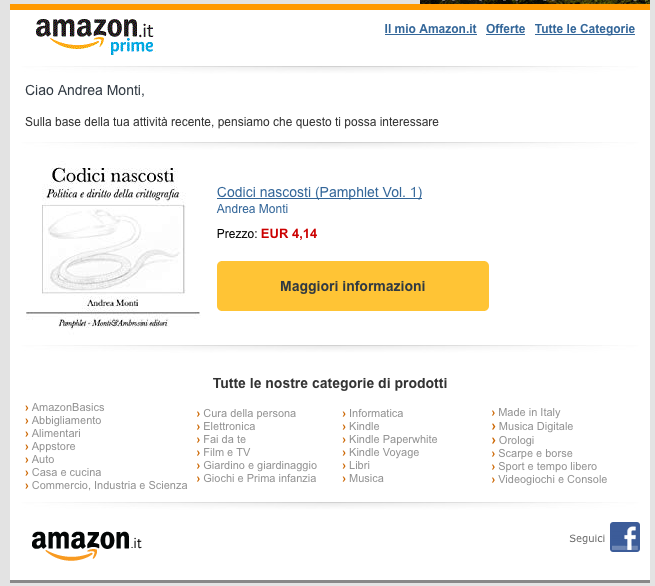According to Forbes, Facebook and Twitter have closed accounts of people linked to the Chinese government and used as anti-propaganda on demonstrations in Hong Kong. The decision came after unspecified “investigations”, at the end of which the two companies decided – in fact – to intervene directly by walking into in a matter of domestic policy of a sovereign state, setting a dangerous precedent. Continue reading “Social Network To Privatize Geopolitical Strategies”
A Real-Life Case of Inefficient Profiling
Amazon knows in extreme detail – thanks to the analysis of purchases – my interests and – thanks to the analysis of how I use my Kindle – my reading habits. Yet he sends me an email to suggest, on the basis of my profiling, to buy a book that I wrote.
If all a giant with a limitless computing might like Amazon is able to extract from my personal data is a suggestion to buy my own books either I’m not actually monitored or profiling just doesn’t work.
Danny Monzeroll, Youtube and Copyright
Every now and then – thank to Youtube – I discover some mind-blowing musician I didn’t know about as it just happened with Canadian, Montreal based artist Danny Monzeroll.
His Pink Floyd songs arrangement for solo classical guitar is nothing but brilliant in terms of composition, execution and recording and – yes – it is freely available on Youtube. While, then, it would have been easy to “forget” about author’s right to be compensated for his work I decided to buy the album as a way to thank Mr. Monzeroll for his masterpiece. Continue reading “Danny Monzeroll, Youtube and Copyright”
The Holy Alliance Between GDPR and Consumer Law
One of the most difficult task in the practical enforcement of the GDPR provisions is to find a fair balancement between the technicality of the legal language and the duty of simplicity settled by the data protection bylaws. Both the GDPR itself and the various “suggestions” coming from the various player are nothing more but a re-phrasing of the legal text, thus leaving the data controller as well as the data subject unable to have clear directions. Continue reading “The Holy Alliance Between GDPR and Consumer Law”
Understanding the robustness of a perimeter defense
This video shows the different penetrating power of various pistol caliber and gives a useful tip for those who (claim to) work in the IT security field: when setting up a perimeter defense, the “penetrating power” of the attack should be taken into account.
In other words, there is no “one-fit-all” solution when it comes to building a digital bulletproof vest, and if somebody thinks that a fancy leather jacket might be the very same than a kevlar vest with ceramic plates, he might be wrong. Deadly, as it would be the infrastructure he claimed to protect.
